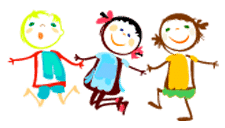
I Infant Cycle 1 and 2 year olds

I Infant Cycle 1 and 2 year olds
EVOLUTIONARY DEVELOPMENT BETWEEN 1 AND 2 YEARS
This is basically an age when a connection with the outside world is established. A child now adapts to new situations, not only by using previously acquired learnings, but also by looking for and finding new means.
The child's great energy and activity at this point leads to the conquest of his/her autonomy. He/she will now be able to remain standing in an upright position and will begin to take their first steps, each time with greater security. Walking will permit children to get their bearings and manipulate objects around them. This will help them to get to know their surroundings better. A child's Nervous System at the age of two, reaches the necessary maturity to access to new learning and better coordination of movement.
EVOLUTIONARY DEVELOPMENT BETWEEN 2 AND 3 YEARS
At the end of the first year, attitudes towards cleanliness will be consolidated as the child will now begin to control sphincters and ask to use the toilet. Hygiene habits should be explained but not imposed. Allowing children to play and explore with different materials such as sand, clay, paints, water and then instructing them to wash their hands, will help promote healthy hygiene habits and cleanliness.
This stage when the "no" arises as the organizer the behaviour. A stage of denial before everything, even before food and this can turn the moment of eating into a "really hard act".
We must keep in mind that "touching" is a completely normal process in a child's development towards food. In this sense, we will try to be as lenient and possible when dealing with eating routines.
"touching" is a completely normal process in a child's development.
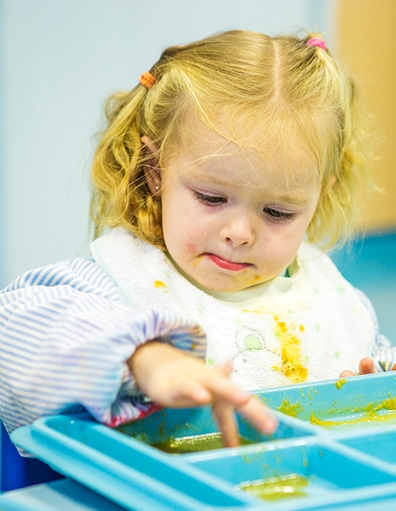
As a result of a child's maturity, at this point a new acquisition will signal an important advance in the child's autonomy. During the day the child will be able to control his physiological needs and ask to go to the toilet. Before reaching three he/she should be able to control these needs during the night when sleeping.
Child, between 1 and 2 years old, play alone or with another child, face to face. They do not yet know how to share games or toys with other children. They will frequently change from one activity to another, although the so-called "major motor activities" of crawling, running, jumping, climbing, will predominate their games.
In this "magical age" children will believe everything that they are told therefore, we should not abuse their credulity. We must never frighten them with the presence of unpleasant characters, nor make them feel our abandonment or loss of affection. Children fear above all thing being left alone or abandoned.
Fear must never be used to make a child desist from those "not convenient" behaviours.
HOW TO AVOID THE PROHIBITION?
All our facilities are designed so that our pupils can develop and progress in a danger free environment and so, we are able to avoid the use of unnecessary prohibitions that would only repress their natural curiosity. They are now able to internalize and repress certain prohibitions and for this reason it is important that reproaches are few, fundamental and permanent. This will give them confidence and security, as well as helping their structure and behavior patterns.
These measures will result enormous progress when dealing with self-control and general control of the body.
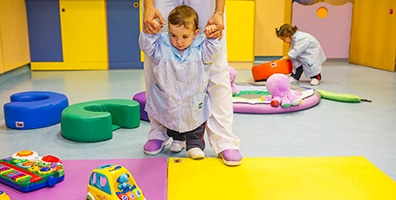
Classrooms
Small groups in all classrooms
Lunch
Lunch is from 12.15h. All pupils are accompanied by their respective teachers or assistants. Groups of 1, 2 and 3 years eat from 12: 15h. at 13:15 h. and have a snack at 4:00 p.m. Pupils aged 0 to 3, receive a daily report which details what the child has eaten, if he/she has slept etc...
Special dietary requirements such as allergies and gluten intolerance are met. Also, the texture of the food is taken into account and is served either as pureed, crushed or in solid form according to the age and development of each child.
A Time and place to rest
- A sleeping mat is provided for each student from the beginning to end of the course and the pupil will always use the same one. The sleeping mats are identified with the pupil's name, group and photo. Sheets will be supplied and will be changed and washed in the laundry twice a week.
- Pupils who have an early start to their day can use this facility at any time of the day and will be supervised at all times by an assistant.
Nursery Projects
Bilingualism program: We approach the English language through games and songs, introducing the language in a natural way.
Musical, Psychomotor Stimulation and Swimming Projects (from 2 years old):
Taking into account the evolutionary moment that these young pupils are living, these very important projects will help them succeed in the acquisition of their autonomy.
My backpack
What do I have to bring to school? At the beginning of the course:
- 5 bibs with t-shirt collar
- Diaper pack
- Wipes package
My class backpack:
- Complete change
- Baby (Change)
- Baby bottle for water
- Pacifier (if you use it)
- Doll or attachment element for sleeping (if used)
If it has been necessary to change the student, the backpack will be returned on Friday. On Wednesday the dirty over shirt (babi) will be returned to parents and will be replaced by the clean one in the backpack. Diapers and wipes should be replaced when the tutor needs indicates, always keeping in mind that they should be brought a week in advance. The five bibs will remain in the center and will be washed daily in our laundry. At the end of the course they are discarded.
My pool backpack (from 2 years old):
- Uniform swimsuit
- Uniform cap
- Flip flops
- Towel
- Comb or brush
This backpack should only be brought to school on the day of this programmed activity and will be returned to parents at the end of the day.
What to do when sick
- When a pupil becomes ill at school, parents are notified immediately. If the antipyretic medication form has been signed and authorized, medication will be given while waiting for parents to arrive and collect their child.
- Pupils will not be able to return to the school until 24 hours without fever or without medication has transpired. This measure is taken to preserve the well-being of all pupils and to prevent the contagion of other children.
- No medication will be administered without the corresponding medical prescription.
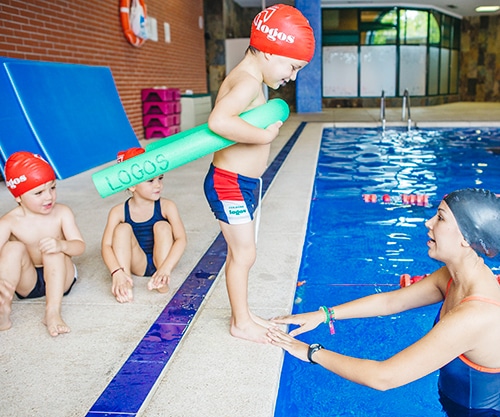
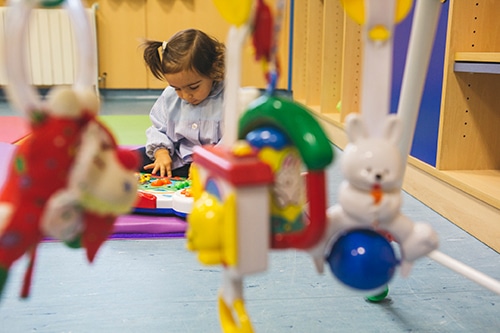
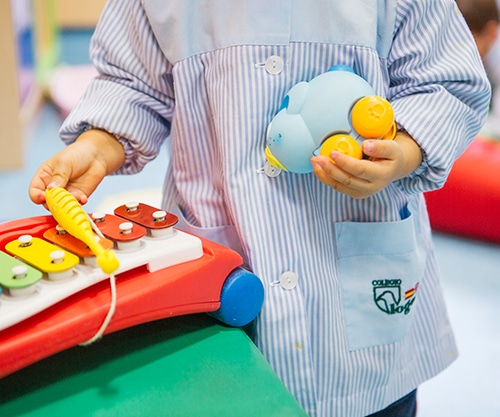
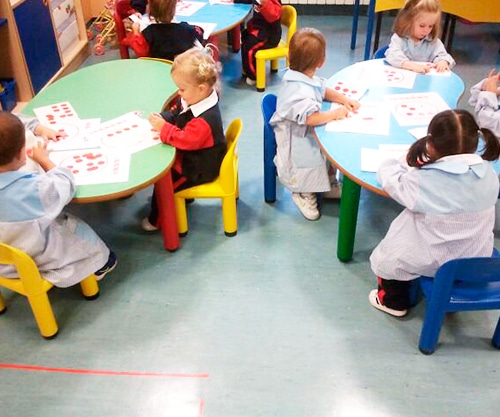
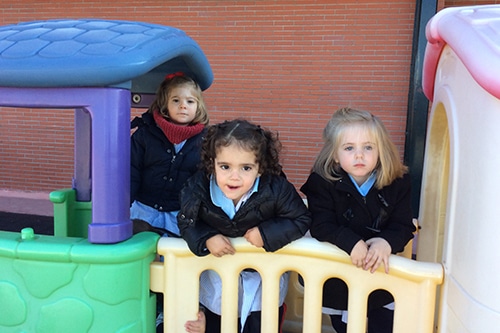
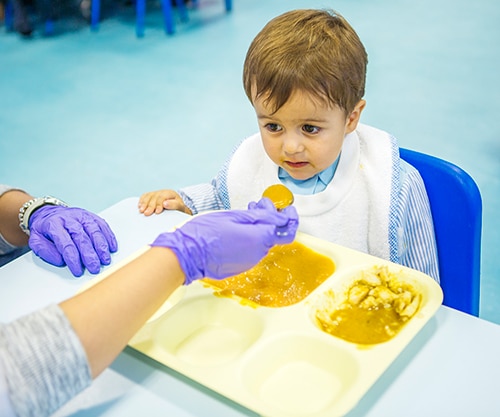
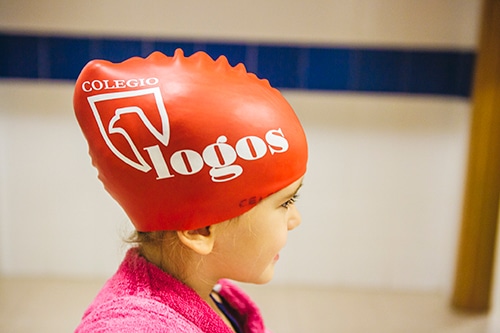
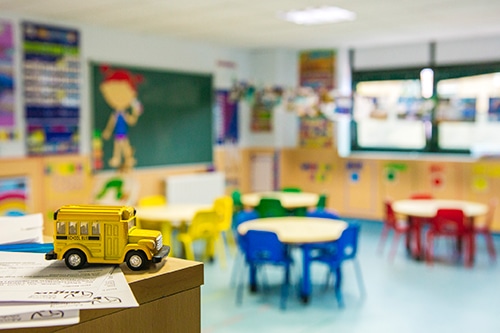
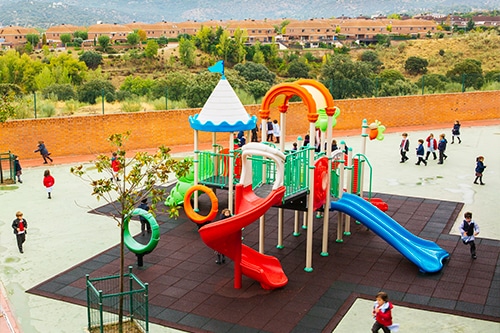
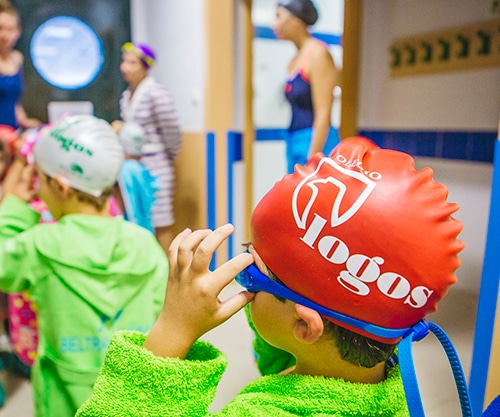
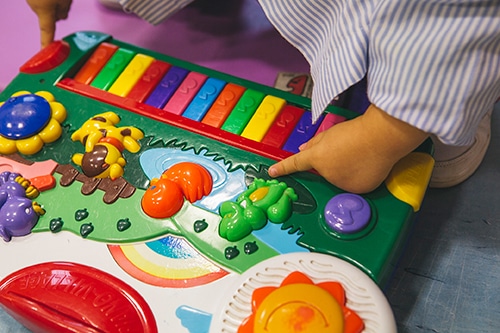
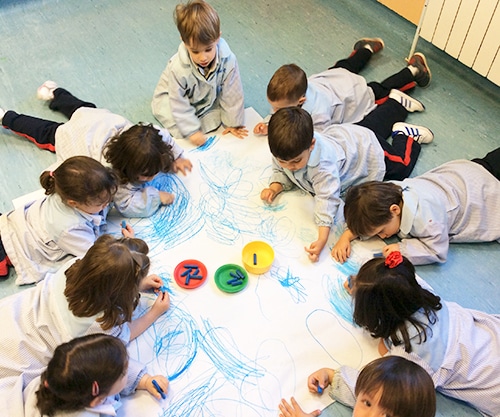
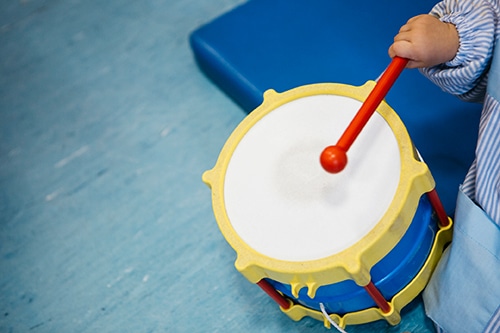
Classrooms
Small groups in all classrooms
A Time and place to rest
- A sleeping mat is provided for each student from the beginning to end of the course and the pupil will always use the same one. The sleeping mats are identified with the pupil's name, group and photo. Sheets will be supplied and will be changed and washed in the laundry twice a week.
- Pupils who have an early start to their day can use this facility at any time of the day and will be supervised at all times by an assistant.
Lunch
Lunch is from 12.15h. All pupils are accompanied by their respective teachers or assistants. Groups of 1, 2 and 3 years eat from 12: 15h. at 13:15 h. and have a snack at 4:00 p.m. Pupils aged 0 to 3, receive a daily report which details what the child has eaten, if he/she has slept etc... Special dietary requirements such as allergies and gluten intolerance are met. Also, the texture of the food is taken into account and is served either as pureed, crushed or in solid form according to the age and development of each child.
Nursery projects
Español: We approach the English language through games and songs, introducing the language in a natural way. Musical, Psychomotor Stimulation and Swimming Projects (from 2 years old):
Taking into account the evolutionary moment that these young pupils are living, these very important projects will help them succeed in the acquisition of their autonomy.
My backpack
What do I have to bring to school? At the beginning of the course:
- 5 bibs with t-shirt collar
- Diaper pack
- Wipes package
My class backpack:
- Complete change
- Baby (Change)
- Baby bottle for water
- Pacifier (if you use it)
- Doll or attachment element for sleeping (if used)
If it has been necessary to change the student, the backpack will be returned on Friday. On Wednesday the dirty over shirt (babi) will be returned to parents and will be replaced by the clean one in the backpack. Diapers and wipes should be replaced when the tutor needs indicates, always keeping in mind that they should be brought a week in advance. The five bibs will remain in the center and will be washed daily in our laundry. At the end of the course they are discarded.
My pool backpack (from 2 years old):
- Uniform swimsuit
- Uniform cap
- Flip flops
- Towel
- Comb or brush
This backpack should only be brought to school on the day of this programmed activity and will be returned to parents at the end of the day.
What to do when sick
- When a pupil becomes ill at school, parents are notified immediately. If the antipyretic medication form has been signed and authorized, medication will be given while waiting for parents to arrive and collect their child.
- Pupils will not be able to return to the school until 24 hours without fever or without medication has transpired. This measure is taken to preserve the well-being of all pupils and to prevent the contagion of other children.
- No medication will be administered without the corresponding medical prescription.













Discover our Nursery Stages

